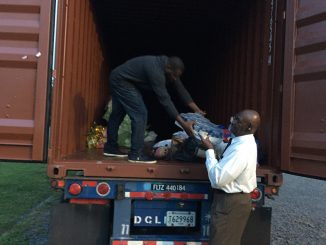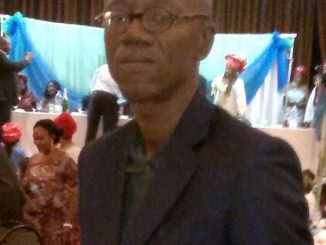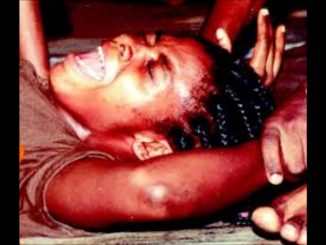
 Delivering his keynote address, President Koroma called on all compatriots irrespective of region, district, ethnic, political or religious affiliation to support, fully participate and take ownership of the entire review process. “This is the best way to make the resulting document a true covenant amongst all of us to honour our common aspirations.” “Good constitutions”, he said, “are not imposed.” “Democratic constitutions are covenantal, they are genuine pacts amongst citizens to constitute themselves into a polity that they would love and honour and whose interests they would put above all else”, the president admonished.
Delivering his keynote address, President Koroma called on all compatriots irrespective of region, district, ethnic, political or religious affiliation to support, fully participate and take ownership of the entire review process. “This is the best way to make the resulting document a true covenant amongst all of us to honour our common aspirations.” “Good constitutions”, he said, “are not imposed.” “Democratic constitutions are covenantal, they are genuine pacts amongst citizens to constitute themselves into a polity that they would love and honour and whose interests they would put above all else”, the president admonished.
Giving a brief background to the constitutional development of Sierra Leone, President Koroma noted that the country has the deepest tradition of written constitutionalism in West Africa, dating as far back as the constitution fashioned by Granville Sharpe for the freed men and women of the Province of Freedom, to the Blackhall Constitution of 1863, the Slater Constitution of 1924 and the Stevenson Constitution of the 1950s. “We gained independence with a constitution modeled along a monarchist Westminster model; we established a republican presidential system in 1971, a one party constitution in 1978 and reverted to a multi-party system in 1991”, the Chief Executive said.
The President also pointed out that the review process was borne not just out of the fact that the 1991 Constitution provided for its own renewal as stipulated in Section 108, but also as recommended by the Lome Peace Accord, the Truth and Reconciliation Commission, the Sierra Leone Conference on Development and Transformation as well as the enduring calls from the women, youth and the physically challenged demanding greater inclusion within governance.
“I took an oath, on becoming President, to uphold the constitution”, he recalled, adding that, “Today, I once again recommit my government to honour, respect, and uphold the letter and spirit of the Constitution in Section 108 that provides for the alteration of this constitution. This review shall be true to the processes prescribed in the constitution for its alteration. The committee will submit its recommendations to my government. Government will in turn look into the report, and submit it to parliament. If parliament approves, it will then be put into a referendum for the people to decide the fate of the proposed covenant.”
He urged all to ensure the review process meets international best practice of modern constitutionalism. This, he maintained, was the best way Sierra Leone can become a truly modern nation, “a nation at peace with itself and the global community, and a nation that can be counted amongst the best-governed societies in the world.” President Koroma further mentioned the fundamental elements of modern constitutionalism that should guide the review process: supremacy of the constitution, the rule of law, respect for human rights, separation of powers, checks and balances, independence of the judiciary, judicial review, equality before the law, civilian oversight/subordination of the military to civilian authority, and free and fair elections.
Moreover, President Koroma admonished the committee to pay close attention to those sections and provisions of the 1991 Constitution that appear to be constitutional ambiguities, ensure greater clarity of “our statutes; and rationalize our governance processes.”
According to Jens Anders Toyberg-Frandzen, Executive Representative of the United Nations Secretary General in Sierra Leone, the review of the constitution, though long awaited, is an important provision of the Lome Peace Agreement of 7th July 1991, and also a key recommendation of the Sierra Leone Truth and Reconciliation Commission. He noted that the review process comes at an opportune time in the country’s transformation from a post-conflict to a development phase, with remarkable achievements to build on and important new challenges to tackle.
“The United Nations welcomes the political commitment and leadership demonstrated by the Government of Sierra Leone, in particular His Excellency the President, to an inclusive and transparent constitutional review process”, said the ERSG, Toyberg-Frandzen, adding that, “We are pleased that the review process, from its very start, is led and owned by the Government and people and national institutions of Sierra Leone. “This”, he went on, “is amply demonstrated in the composition of the Constitutional Review Committee.” He pledged the UN’s unwavering financial support as well as that of other development partners, including the UK Department for International Development (DFID) and the European Union.
In his statement on the road traveled so far in constituting the Committee, Franklyn Bai Kargbo, Attorney General and Minister of Justice noted that a broad-based Constitutional Review Process with some eighty members drawn from all facets of society was constituted in conformity with the principles of good governance and inclusiveness as well as encourage the full participation of the people of Sierra Leone in the building block of the democratic process. He also disclosed that the Chairman of the Committee is the eminently qualified Hon. Justice Edmond Cowan, a retired judge of the Superior Courts of Judicature and former Speaker of Parliament.
According to the venerable Attorney General and Minister of Justice, the projected operational budget to cover the whole process amounts to approximately, $4,600,000 Million US Dollars. He also revealed that a basket fund has already been established in partnership with the UN to ensure the process is a success. “In this connection, the government itself has shown its commitment by completely funding the launching ceremony this morning and has pledged to provide further fiscal support with a resource envelope in the region of $1,100,000 Million US dollars”, said Mr. Franklyn Bai Kargbo.
The Minority Leader of Parliament, Hon. Bernadette Lahai called for an all inclusive process reflecting the real aspirations of the people of Sierra Leone.
The well-attended ceremony was ably chaired by the Minister of Information and Communication, Alhaji Alpha Kanu. Also in attendance was the Vice President, Alhaji Chief Sam Sumana, Cabinet Ministers and their deputies, Paramount Chiefs, senior government officials and members of civil society, youth and women’s groups all across the country.



